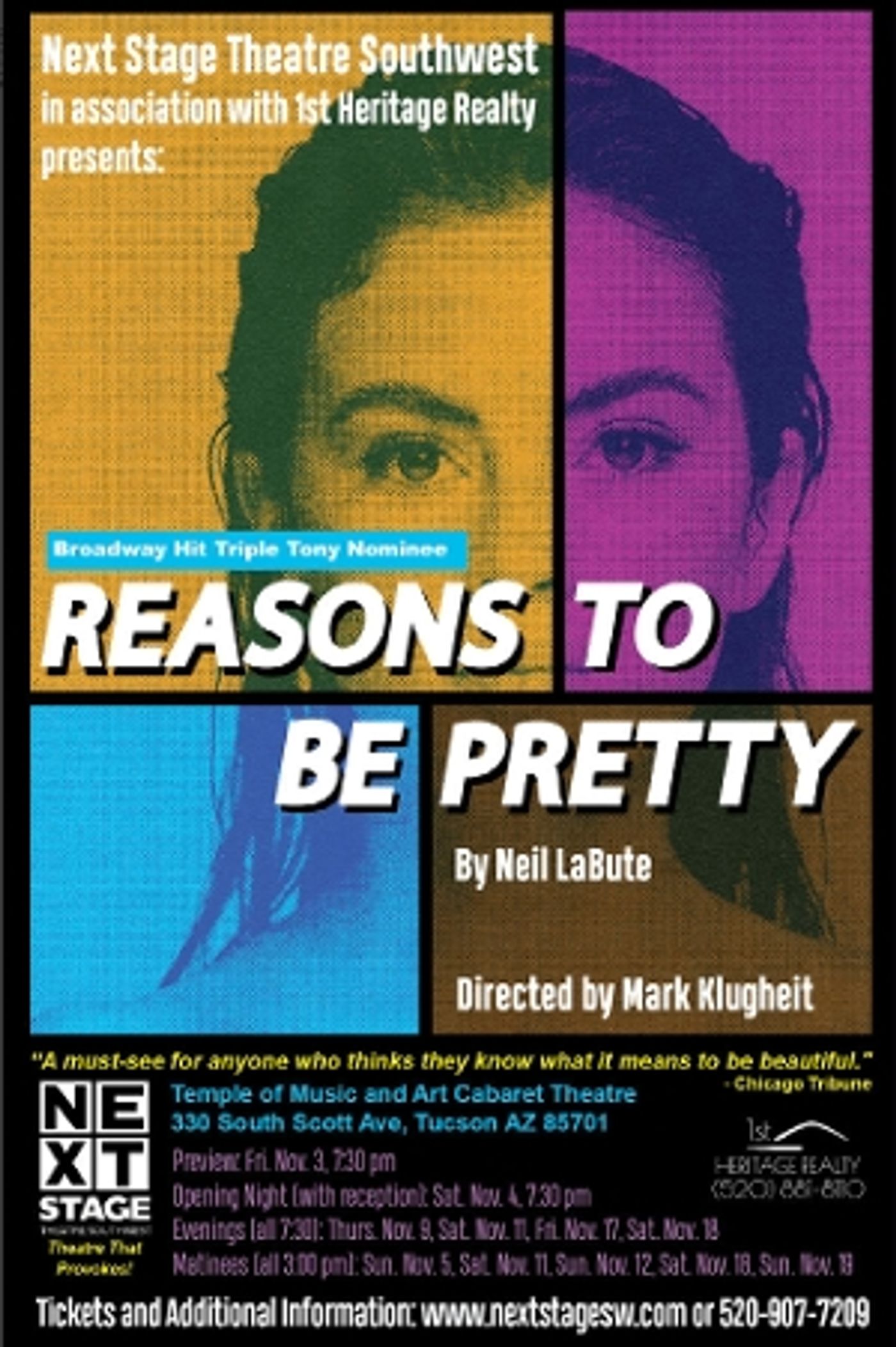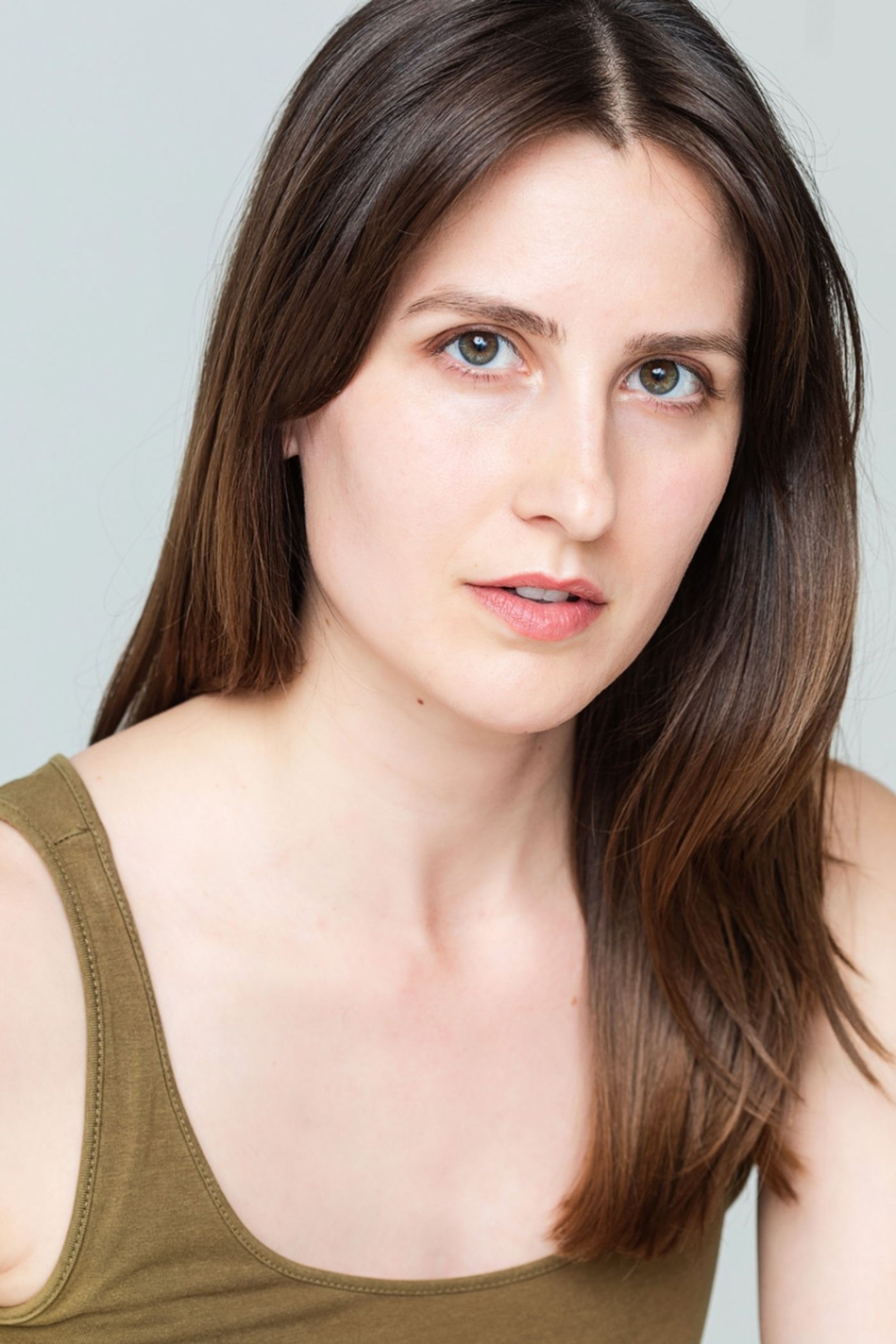Feature: Neil LaBute Play Takes Center Stage at ATC Cabaret
Samantha Cormier and Taigé Lauren discuss the play’s controversial themes in today’s social climate.

Few living playwrights have established as controversial a reputation as Neil LaBute. Famed for his candid and unfiltered depiction of male-female relationships, the playwright has long navigated a divisive terrain, leaving some audiences debating his relevance in today's hyper-sensitive gender politics.
LaBute's play, REASONS TO BE PRETTY, is set to open on November 4th (preview November 3rd) at the ATC Cabaret Theatre, courtesy of Next Stage Theatre Southwest. Director Mark Klugheit gladly takes the playwright's baton, hawking a dissonant refrain just as local audiences are warming up to diversified content and larger theater companies are mounting rom-com revivals.
LaBute's audacity to knuckle down on dysfunctional subjects complements his savvy for deploying a naturalistic dialogue. Lauded by the New York Times for its "freshest and most illuminating dialogue to be heard anywhere," REASONS TO BE PRETTY -- like FAT PIG and IN THE COMPANY OF MEN before it -- is at once clouded by allegations of misogyny, raising questions about the fine line between artistic mission and social responsibility.
To his credit, Klugheit considers the controversy as a chance to engage an otherwise piercing inquiry into our cultural obsession with physical beauty. REASONS TO BE PRETTY paints an unflinching portrait of seemingly reasonable Americans in emotional crisis -- socially well-adjusted folks who suffer from profound insecurity and power struggles.
Klugheit is aware of LaBute's reputation for perpetuating a narrative of women through the male gaze. Undoubtedly, the director-producer will argue that LaBute's probing dialogue cuts to the core of human emotions, forcing audiences to confront uncomfortable truths about themselves.
As a nod to progressive values and gender dynamics, Mark Klugheit has reached out to Broadway World for an interview with her two actors, Samantha Cormier and Taigé Lauren, for a chance to hear a female perspective on LaBute's play. While it leaves him vulnerable to a woman's righteous accounting, Klugheit proves his point that no better place exists to address a controversy than the theater.
%20copy.jpg?format=auto&width=1400)
Thanks for making the time. Mark is proud to have both of you in the show.
SAMANTHA: Oh, good. He's able to facilitate thought-provoking theater that people should see. If people want a good argument, see the show and talk about it.
LaBute does bring up our shadow elements, especially around relationships. Both of you are strong, opinionated women. Granted, an actor must find a way to make anything work, but I'm curious how strong women feel about a male-centric perspective on a play. In his defense, the playwright does an excellent job of airing out men's dirty laundry.
SAMANTHA: Right? I've been thinking about it the last couple of days. Wow, a man did write this part for a woman! I think of my recent experience as a female director for VENUS IN FUR, having that "female eye" on the play. Some of these are just hard for me to get there – or maybe it's just hard for Samantha to get there for my character, Stephanie. But I know women like that. I know women who will go to that extreme or feel hurt for that [experience]. He (LaBute) does a decent job of creating a voice for a woman, but --
Well, how would a female playwright write about it?
SAMANTHA: I don't know if she would. Would a woman write about relationships based on looks alone? Looks to women don't mean as much as looks to men. A lot of men always have to have their arm candy. Or, like, he's 60, and I'm 20, that kind of thing. When I started working with this one company, I was matched up with much older men. So, the man can get older, but the female cannot. Once you hit a certain age, then you're a "character actor."
That was the case in the old days; no one batted an eye. You're saying these themes are too dated.
SAMANTHA: I like going to the type of theater that makes me uncomfortable, but it isn't something I would necessarily want to produce. It wouldn't be something I would like. I would rather have done [LaBute's} THE SHAPE OF THINGS, which I think gives you more of the female perspective – in a shocking way.

So which one of you plays Carly, the "pretty one"? Is it you, Taigé?
TAIGÉ: Yeah. I was going to say that the perspective is really limited. When I objectively read the play as an artist, I'm thinking and hearing the little taglines about the show, like, "This play explores beauty and relationships." As an artist, when I read the space, I agree – yes, it's a play examining beauty and relationships, but the exploration is limited on the page to the perspective of the male gaze on women -- within the context of heteronormative relationships between able-bodied, predominantly white people. And so, sure, it's about beauty, but from a really limited scope, [especially] at this point in 2023 when our social conversations (and our social consciousness on things like beauty and relationships) have expanded to include more of the galaxy of what those things are. And so the challenge for me as an actor is to put aside my opinions about stories written from that perspective – because I certainly have them, right? – and build a life and a character that is a whole human being within these circumstances, and give Carly the same nuance and complexity that's easily afforded to the men in these plays.
So, that challenge is the actor's immediate payoff.
TAIGÉ: Hopefully, it subverts the male gaze a little bit.
From a theatrical standpoint, the play features solid interpersonal dynamics. How do your characters evolve or change throughout the play, and what insights can the audience gain from this transformation?
TAIGÉ : It's not Carly's story. It's not Carly's play. But at the beginning of the play, she has a strong sense of what her friend deserves, and she can spot a red flag a mile away for her friend. But for herself, she has the blinders on in terms of what she will put up with. And in terms of what she deserves, we see Carly in relation to the men's trajectories. The main event for her, the catalyst for change, is the final moment we see her on stage. And then we don't get to see whether change occurs for her or not.
In the end, we're all rooting for her to choose herself like Steph did at the top of the play. So there's that mirroring happening where she's not holding the power at the end. She hasn't stepped into herself fully yet, but we're rooting for her that she does.
Do the men change?
SAMANTHA: I don't know if Kent necessarily changes, but Greg does; I mean, he's the protagonist. You see his story, you see him; in each scene, you see him grow or learn a little bit because you said something about taking off blinders: almost all these characters are taking off blinders at one point. Like me, it's right at the beginning, like, I'm taking off these blinders. And then maybe it wasn't necessarily that he called me "regular," but it was a buildup of him not completely respecting her...She had to see what she was missing through the lens of another man. This guy loves me for who I am.
Why do you want people to see the show?
To get people's engines going. And I mean, it's 90 minutes. It's fun, it's entertaining, especially for people that are our age. It's topical, you know? People could agree with it and not agree with it; it'd be like, that was just a shit play. Why this play? Why now? We're ready for bigger steps for women. The protagonist should have been Stephanie or Carly to see their journey. That might be more interesting to me, especially from Carly's point of view, because here -- how did she become a security guard? How did she get there? Being with Kent, you know, means she probably wasn't with many great guys. What an interesting story there. What happens to the baby? You know, do they break up? I don't know how she gets out of that. Which takes it to another level, being a mother.
TAIGÉ: I think we should be more and more critical of the things we go to see. If the point of this play is that the audience comes and says, no, let's not do LaBute plays anymore in 2023, that's a great conversation to have within our theater community. Let's start to get clear of what is edgy -- something that is with the times and is speaking to the most people, and thought-provoking in a forward-moving way. If we're supposed to be holding the mirror up to nature, what is the reflection we're showing?
Well, we know that it's a mirror for men.
SAMANTHA: It's a mirror for men to see. I mean, theater's educational. If you want to know what the 1940s are like, read a play from the 1940s, [but] this will tell you more than a history book. But it's not progressive. But I learned to pull the veil. The audience would have to be listening and open-minded to the play to be able to get those thoughts.
I find it ironic that we're discussing a play from 2008 as a period piece.
TAIGÉ: Certain things hadn't been set when this play happened. One of the saving graces of the play as a text is that LaBute offers the opinion to do away with the monologues, which is the only way that makes it accessible at all today. So, for me, it becomes an exercise in suspending judgment and just playing the character truthfully in the given circumstances -- and letting the moral ambiguity go out the window when I ask why.
REASONS TO BE PRETTY runs November 3 - November 19
Videos

